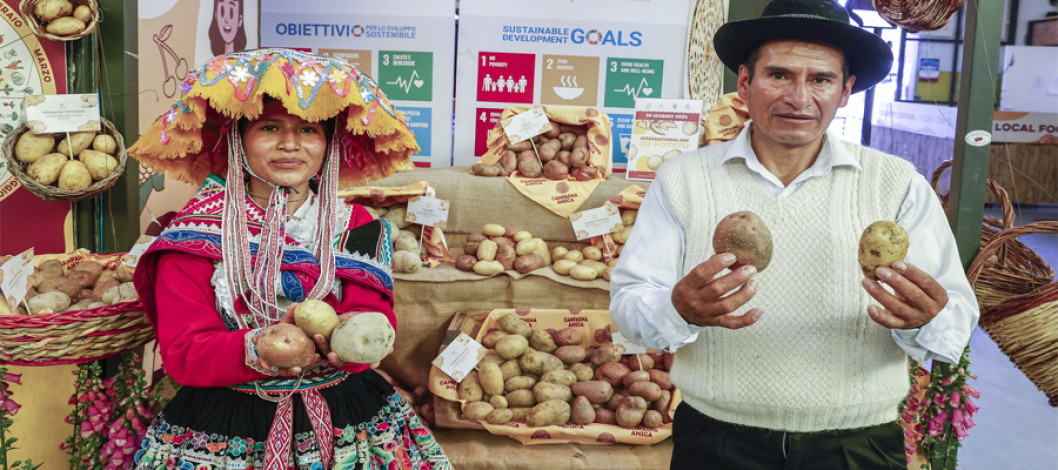
The genetic diversity of potatoes encompasses about 5,000 varieties planted worldwide. Photo: Collected
Eaten by over one billion people, the potato is the third most available food crop globally – after rice and wheat, making it a crucial staple. And today for the first time, it was celebrated with its very own International Day, as the Food and Agriculture Organization of the United Nations (FAO) and partners highlighted the potato’s significance and called for more investments to tap into its full potential.
“The potato has been the most important lifesaving, staple food and nutritious vegetable in the world,” FAO Director-General QU Dongyu said in a video message to mark the event, under the theme of “Harvesting diversity, feeding hope”. Qu added that in Europe, the increase in potato production after the 16th century following Christopher Colombus’ return from the Americas with the potato, which originated in the Andes, has impacted food security dramatically.
Participants in a high-level event at FAO’s headquarters to mark the day included Angel Manuel Manero Campos, Minister of Agrarian Development and Irrigation of Peru, who spoke about the country’s efforts to ensure its potato producers can obtain a fair price for their crop and Paula Narváez, President of the United Nations Economic and Social Council (ECOSOC), who underlined the importance of protecting the potato and its significance for achieving a number of the UN Sustainable Development Goals.
In an earlier special event, speakers from the World Potato Congress, the private sector, and the International Potato Center (CIP), shared lessons learned and perspectives on their future work on the potato. This technical panel was convened by Peru – which championed the designation of the International Day by the UN General Assembly last year – with the support of Belgium, Ireland, Italy, and the Netherlands. Participants underscored the significant advances in the genetic improvement of the crop and the agronomics as well as the importance of plant health. They also called for concerted efforts to tackle constraints including pests and diseases, especially in light of climate change pressures and an increasing global population.
Potato’s significance
The FAO Director-General highlighted three key aspects of the potato’s relevance in addressing current global challenges, including conflicts, the climate crisis, and economic shocks:
First: The potato is an important staple food, which contains vital nutrients and is consumed by more than two-thirds of the world’s population in different forms. While many other crops, especially cereals, are not sufficiently resilient to challenges, such as soil degradation and water scarcity, the potato has the potential for increased productivity. Farmers in approximately 160 countries now produce almost 400 million tonnes of potatoes a year. With 735 million people suffering from hunger, potatoes can have a significant role in improving food security and nutrition.
Second: The genetic diversity of potatoes encompasses about 5,000 varieties planted worldwide, yet most of the potatoes produced globally come from a narrow genetic background. Tapping the genetic diversity could help address stresses due to climate change, pests, and diseases, and also further improve the potato’s nutritional value. This will require strengthening research and development, especially for genetic improvement – using efficiency-enhancing technologies that shorten the plant breeding cycles, and new methodologies for virus-free seed tubers production.
Third: The potato offers livelihood opportunities for the many farmers who grow it as a cash crop, and those working along its value chain, especially rural small-scale and family farmers. However, we need to exploit its full potential from production, through processing to consumption. With appropriate technologies and equipment, farmers can minimize inputs, minimize damage to the soil, and reduce the loss of crops. Processors can innovate with new functional and healthy products, adding value to products and growing their profit margins.
FAO initiatives
Initiatives like FAO’s One Country One Priority Product will be key to support maximizing the potato’s potential. For instance, under this initiative, FAO is working with Lesotho to strengthen the crop’s value chain. FAO also works with Peru to improve the conservation of the crop’s irreplaceable genetic diversity and its overall value chain, through the South-South Cooperation mechanism. And, in the Republic of Azerbaijan, FAO has been working with the government to introduce new varieties and establish a national disease-free seed system.
Through bodies such as the International Treaty for Plant Genetic Resources for Food and Agriculture, the Codex Alimentarius Commission, and the International Plant Protection Convention, FAO is also working to ensure access to the crop’s genetic resources, the fair and equitable sharing of the accruing benefits, and enhance its Members’ capacities for the safe trade of the crop and products.
Earlier in the day, as part of the celebrations for International Day, FAO along with Italy’s largest farmers’ association, Coldiretti, organized an event at Rome’s Campagna Amica farmer’s market. With the presence of a group of Italian and Peruvian farmers, the theme of the event was “Producers supporting potato diversity” and included a cooking demonstration and tasting of an Italian potato-based dish – gnocchi.
Source: Online/GFMM
Comment Now